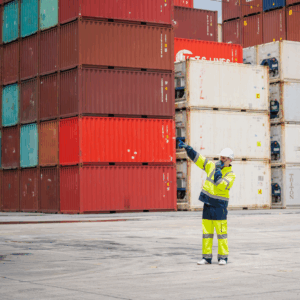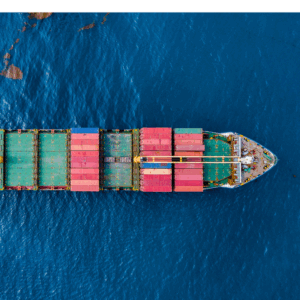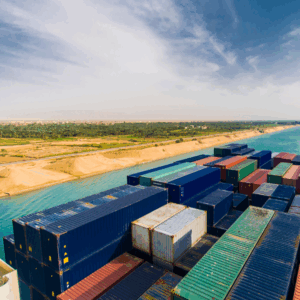 In today’s globalized and unpredictable economy, companies face new challenges that constantly disrupt the supply chain. From sudden shifts in demand to geopolitical tensions and transportation delays, supply chain uncertainty has become the new norm. At the same time, innovative logistics strategies such as freight consolidation are helping businesses reduce costs and enhance operational efficiency. This article examines supply chain uncertainty, the role of freight consolidation in addressing it, and how ExFreight’s digital logistics platform enables shippers to navigate these challenges with confidence and clarity.
In today’s globalized and unpredictable economy, companies face new challenges that constantly disrupt the supply chain. From sudden shifts in demand to geopolitical tensions and transportation delays, supply chain uncertainty has become the new norm. At the same time, innovative logistics strategies such as freight consolidation are helping businesses reduce costs and enhance operational efficiency. This article examines supply chain uncertainty, the role of freight consolidation in addressing it, and how ExFreight’s digital logistics platform enables shippers to navigate these challenges with confidence and clarity.
What Is Supply Chain Uncertainty?
Supply chain uncertainty refers to the unpredictability of companies in forecasting demand, sourcing materials, and managing logistics. It stems from shifts in customer behavior, raw material shortages, port congestion, labor strikes, and natural disasters. This uncertainty creates delays, inflates transportation costs, and weakens a company’s planning ability. Managing it requires flexibility, data-driven forecasting, and strategic partnerships with logistics providers that offer real-time visibility and scalable solutions.
Demand uncertainty is particularly critical for businesses as they struggle to align their inventory with fluctuating market needs. In contrast, supply uncertainty occurs when disruptions occur on the supplier side, such as manufacturing delays or transportation failures. Both affect logistics management and the ability to deliver on time. Meanwhile, operational uncertainty refers to breakdowns within a company’s logistics network, such as system failures, human error, or inefficiencies in the warehouse. These variables make planning complex and push businesses to seek more agile and efficient supply chain strategies.
The Supply Chain Uncertainty Framework
Companies can adopt structured frameworks to respond to such volatility. Fisher’s model categorizes products as either functional or innovative. Functional products with predictable demand and stable life cycles benefit from efficient supply chains focused on cost reduction and reliability. Innovative products, characterized by short lifecycles and unpredictable demand, require agile supply chains prioritizing speed and responsiveness.
Expanding on this, Hau Lee introduced a framework that considers both demand and supply uncertainty. He identified four types of supply chains: efficient, risk-hedging, responsive, and agile. Each type requires specific logistics strategies. For example, an agile supply chain is particularly well-suited for industries with high demand and significant supply uncertainty, such as the fashion and consumer electronics sectors. On the other hand, companies dealing with stable suppliers and predictable demand, such as those in bulk commodities, should opt for an efficient supply chain. This framework enables businesses to establish a logistics network that strikes a balance between reliability, flexibility, and cost.

Freight consolidation is the process of combining smaller shipments from multiple shippers into a single, larger, and cost-effective shipment. It applies to all modes of transportation—air, ocean, and ground. For example, LTL (Less Than Truckload) refers to ground freight that doesn’t fill an entire truck, while LCL (Less Than Container Load) refers to ocean freight that doesn’t occupy a whole shipping container. Instead of sending multiple partial loads, consolidation merges them into one shipment, reducing transportation costs and environmental impact.
In addition to lowering costs, consolidation simplifies the freight process. When shipments are combined, fewer trucks or containers are needed, which reduces congestion at loading docks and streamlines operations. By sharing space and transportation resources, businesses can ship more efficiently without reaching full truckload or container volume. It also enhances predictability and reduces the risk of damage during transit, as consolidated cargo typically undergoes fewer handling points.
How Freight Consolidation Benefits Shippers
Freight consolidation provides multiple strategic advantages for shippers seeking to optimize their supply chains. The most immediate benefit is cost savings. Instead of paying for unused space in trucks or containers, businesses share transportation with other shippers, significantly reducing individual shipping costs. For many small and medium-sized companies, consolidation provides access to competitive freight rates that were previously only available to high-volume shippers.
This strategy also increases control over transit schedules. With consolidated freight, shipments often follow optimized routes, resulting in more predictable delivery times. There is also a notable reduction in cargo handling, which lowers the risk of product damage during transit. By working with a trusted logistics provider like ExFreight, shippers can access advanced tracking systems and consolidated documentation, making the process easier to manage. The ability to obtain a single freight quote for a multi-origin, multi-destination shipment further simplifies logistics planning.

Freight consolidation is ideal when businesses consistently ship small loads that don’t justify full truckload or container rates. It’s beneficial for international freight shipping, where container space is expensive, and underutilized shipments can become cost-prohibitive. It also proves efficient when delivery timelines are flexible, as it may require slightly more coordination to group shipments for optimal routing.
For example, a business importing parts from multiple suppliers in Asia can consolidate them into one LCL ocean freight shipment to reduce costs and streamline customs procedures. Similarly, a domestic company shipping pallets across the country may utilize LTL services to consolidate loads for similar destinations, thereby minimizing transportation expenses and transit time. ExFreight offers digital tools that enable the identification of real-time consolidation opportunities, allowing companies to maximize efficiency and cost-effectiveness.
How ExFreight Supports Efficient Freight Consolidation
ExFreight simplifies freight consolidation by providing a digital platform that connects shippers to global carriers at real-time rates. Whether shipping domestically or internationally, our system enables businesses to generate quotes instantly, compare carrier performance, and book shipments with just a few clicks. With door-to-door LTL and LCL service coverage in over 150 countries, our logistics solutions are designed to make complex shipping feel seamless.
Through direct API integrations with leading air and ocean carriers, ExFreight ensures that your consolidated shipments receive the most competitive rates. Our system calculates optimal freight class based on density, helping you avoid unnecessary reclassification fees. We also offer dynamic LCL cargo rates, FCL container options, and access to instant shipping rates for all shipping modes. The platform provides complete shipment visibility through map-based tracking and automated email updates. In addition, ExFreight offers insurance coverage at the time of booking to protect against potential losses or damage.

Many businesses ask, “What exactly is supply chain uncertainty?” The lack of predictability in supply, demand, and logistics operations makes it difficult for companies to plan and execute shipments effectively. Another common question is, “What is demand uncertainty in the supply chain?” This refers to the challenge of forecasting customer needs and preferences, which can fluctuate due to market changes, seasonal variations, or economic factors.
Shippers often wonder what consolidation means in freight forwarding. It’s the process of combining multiple shipments into one load to reduce transportation costs and simplify logistics. How does freight consolidation benefit shippers? It enables lower shipping costs, faster delivery through optimized routes, and a reduced risk of cargo damage. ExFreight regularly answers additional client questions, including which trucking services we offer. We offer both Less Than Truckload (LTL) and Full Truckload (FTL) trucking services across North America and Europe.
Regarding documentation, what’s required to ship internationally includes a commercial invoice, packing list, and, when needed, a Shipper’s Letter of Instruction (SLI). Each international freight service offered by ExFreight includes customs clearance, delivery, and live tracking. Regarding liability, the maximum coverage available without additional insurance depends on the carrier’s limits; however, ExFreight offers affordable coverage options during booking to ensure peace of mind.

ExFreight’s digital platform provides the technology and support to implement these strategies successfully. We enable businesses to build efficient and resilient logistics networks with instant freight quotes, global reach, advanced tracking, and API connectivity. If you’re ready to optimize your supply chain and reduce costs through freight consolidation, we invite you to explore our solutions. Get a freight quote today and see how ExFreight can streamline your shipping—no matter where you do business.



Leave A Comment
You must be logged in to post a comment.